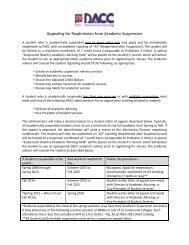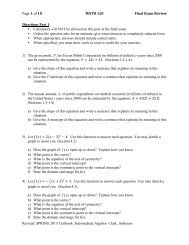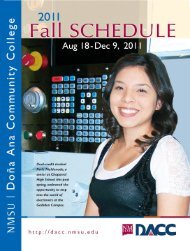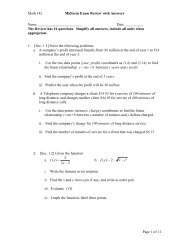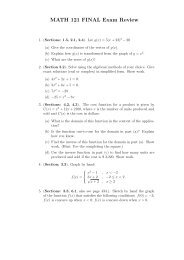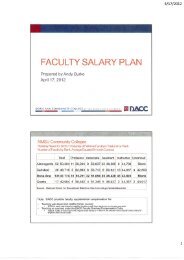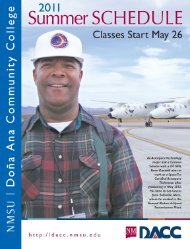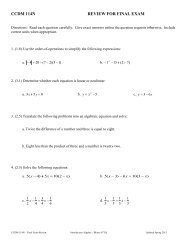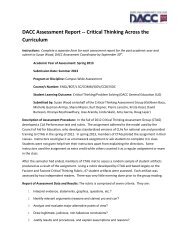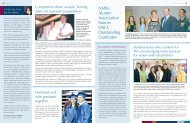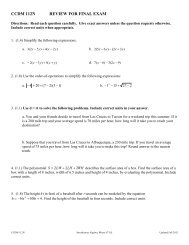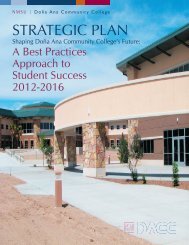110 Doña <strong>Ana</strong> <strong>Community</strong> <strong>College</strong>OEEM 245. EMT–Paramedic Field Internship III1–3 cr.Continuation of OEEM 242. Prerequisites: OEEM 242 and consent of instructor. Restrictedto majors. Requires a C or better to pass.OEEM 247. Emergency Medical Technician–Paramedic Refresher 2 cr. (1+3P)A comprehensive review of prehospital emergency medicine for the EMT Paramedic.<strong>New</strong> material relevant to recertification of the <strong>New</strong> <strong>Mexico</strong> and Nationally RegisteredParamedic licensure. Graded S/U.OEEM 250. RN to EMT–Paramedic Transition Course6 cr.Enhanced skill instruction and didactic integration designed to meet the requirementsfor an EMT Paramedic certificate. Prerequisites: current NM EMT Basic licensure, RNlicensure, ACLS, PALS certification and 2 years experience in the critical care settingor equivalent. Corequisites: OEEM 250L and OEEM 251. Requires a C or better to pass.OEEM 250L. RN to EMT Paramedic Transition lab3 cr. (9P)Enhanced skill instruction and didactic integration designed to meet the requirementsfor an EMT Paramedic certificate. Prerequisites: current NM EMT Basic licensure, RNlicensure, ACLS, PALS certification. Corequisites: OEEM 250 and 251. Requires a Cor better to pass.OEEM 251. RN to Paramedic Field/Clinical3 cr. (9P)Advanced pre-hospital skills and assigned clinical experiences in patient assessmentand specific management technique. Minimum hours and completion of course objectivesrequired for successful completion. Prerequisites: current NM EMT Basic licensure,RN licensure, ACLS, PALS certification. Corequisites: OEEM 250 and 250L.Requires a C or better to pass.OEEM 252. RN to Paramedic Internship3 cr. (9P)Continued focus on advance pre-hospital skills and knowledge with increasing responsibilityfor patient care. Minimum hours and completion of course objective requiredfor successful completion. Prerequisites: OEEM 250, 250L, and 251. Requiresa C or better to pass.OEEM 253. Critical Care Emergency Medical Transport Program 6 cr. (5+6P)This course will provide further education to Paramedics, Registered Nurses andRegistered Respiratory Therapists who wish to function as part of a critical care transportteam. Consent of instructor required. Prerequisite: Licensed Paramedic, RegisteredNurse, or Registered Respiratory Therapist with one or more years experience.OEEM 254. Pediatric & Neonatal Critical Care Transport 5 cr. (4+3P)This course is designed to prepare paramedics, nurses and respiratory therapists tofunction as members of a pediatric and neonatal critical care transport team. Consentof instructor required. Prerequisite: Licensed Paramedic, Registered Nurse, or RegisteredRespiratory Therapist with one or more years experience.OEEM 290. Independent Study1–3 cr.Individual studies directed by a consenting faculty member and prior approval ofthe department head. Prerequisites: OEEM 150 and consent of instructor. May berepeated for a maximum of 6 credits. Requires a C or better to pass.OEET—Electrical TradesOEET 110. Basic Electricity and Electronics4 cr. (3+3P)An introduction to electricity theory and practice, including electron theory, Ohm’slaw, construction of electrical circuits, direct and alternating currents, magnetism,transformers, and practical applications. Same as OEAR 102, OEES 105, OEPB 102.OEET 130. Introduction to Electrical Power Systems2 cr.An overview of electrical power systems, equipment, safety practices, first aid andCPR. Prerequisite: acceptance into the electrical lineworker program. Corequisites:OEET 110 and 131. Restricted to majors.OEET 131. Electrical Lineworker Lab I6 cr. (12P)Climbing and work on utility poles using ropes and rigging, pole setting and an introductionto transmission and distribution line construction. Maintenance and troubleshootingto include the use of hot sticks. Prerequisite: acceptance into the electricallineworker program. Corequisites: OEET 110 and 130. Restricted to majors.OEET 140. Electrical Power Systems II3 cr. (2+2P)Theory of power generation and distribution with emphasis on three phase systemsto include transformers, voltage regulators, surge arrestors. Includes troubleshooting.Prerequisites: acceptance into the electrical lineworker program and OEET 130.Corequisite: OEET 141. Restricted to majors.OEET 141. Electrical Lineworker II6 cr. (12P)Practice in the installation of electrical power lines including transformers, voltageregulators, and surge arrestors. Also advanced hot sticking procedures, troubleshooting,underground systems procedures, and pole-top rescue. Prerequisites: Acceptanceinto lineworker program and OEET 131. Corequisite: OEET 140. Restricted to majors.OEET 151. Electrical Apprenticeship I6 cr.Apprenticeship responsibilities and benefits as well as first aid and CPR will be covered.Hand tools, electrical theory, and the regulations imposed by national codesand OSHA. Students will apply theory taught in their jobs. Prerequisite: consent ofinstructor.OEET 152. Electrical Apprenticeship II6 cr.OHM’s law circuit sizing and service panel sizing will be covered in detail. Othertopics include low voltage systems, heating and air conditioning circuits, alarm systemsand smoke detectors. Prerequisites: OEET 151 and consent of instructor.OEET 153. Electrical Apprenticeship III6 cr.Various electrical measuring devices will be covered in detail. Inductance, transformers,capacitance, and simple motors will be studied. Prerequisites: OEET 152 andconsent of instructor.OEET 154. Electrical Apprenticeship IV6 cr.Theory and application of three-phase transformers and autotransformers. Electricaldistribution using switchboards, panelboards, and circuit breakers. Prerequisites:OEET 153 and consent of instructor.OEET 221. Cooperative Experience I1–4 cr.Supervised cooperative work program. Student is employed in an approved occupationand is supervised and rated by the employer and instructor. Student will meet ina weekly class. Graded S/U. Prerequisite: consent of instructor.OEET 222. Cooperative Experience II1–4 cr.Continuation of OEET 221. Prerequisite: consent of instructor. Graded S/U.OEET 251. Electrical Apprenticeship V6 cr.Commercial/industrial applications for electricians. Blueprint interpretation, commercialconstruction types and processes, wiring methods, wiring materials, and motorcontrols. Prerequisites: OEET 154 and consent of instructor.OEET 252. Electrical Apprenticeship VI6 cr.In-depth commercial applications to include commercial/industrial service calculations,mobile home parks, multi-family dwellings, and commercial fire/security systems.Prerequisites: OEET 251 and consent of instructor.OEET 253. Electrical Apprenticeship VII6 cr.Control devices in commercial/industrial applications; emphasis on logic in-line diagrams,time delay starters, reversing starters, and manual/magnetic solenoids. Prerequisites:OEET 252 and consent of instructor.OEET 254. Electrical Apprenticeship VIII6 cr.Miscellaneous topics for the journeyperson electrician to include power distribution/transmission, solid state controls and relays, photoelectric and proximity controls andprogrammable controllers. Prerequisites: OEET 253 and consent of instructor.OEHO—See “AHS”OETS—Technical StudiesOETS 102. Career Readiness Certification Preparation1–3 cr.This course is designed to prepare students to successfully obtain Career ReadinessCertifications in all areas and at the appropriate levels for their program of study.Graded: S/U.OETS 103. Technical Career Skills4 cr.This course will be project-based and will encompass writing, presentation, math,reading, and critical thinking skills applied in a technical environment.OETS 104. Basic Mathematics for Technicians4 cr.Fundamental mathematical concepts and computations including measurement, ratioand proportions, and pre-algebra as it relates to technical programs. Prerequisite:appropriate placement test score.OETS 105. Building <strong>Ana</strong>lyst 1 4 cr. (3+ 2P)This course is designed to provide the foundational knowledge and expertise necessaryfor the energy auditor and home-performance contractor.OETS 106. Building <strong>Ana</strong>lyst II3 cr. (2+2P)Designed to prepare the student for the BPI Building <strong>Ana</strong>lyst Certification. This coursewill walk the student through the hands-on process of conducting visual buildinginspections, diagnostic testing, identifying improvement opportunities, documentinga home’s performance and preparing a scope of work. Prerequisite: OETS 105.OETS 118. Mathematics for Technicians3 cr. (2+2P)<strong>Ana</strong>lysis and problem solving of technical problems using measuring instruments andtechniques of arithmetic, algebra, geometry, and trigonometry. Prerequisite: CCDM104N or appropriate placement test score.
2012-2013 <strong>Catalog</strong> 111OETS 156. Building Envelope3 cr. (2+2P)Designed to prepare the student for the BPI Building Envelope Certification. Thiscourse will provide the principles behind building performance testing and the purposeof completing a comprehensive energy audit. Through lecture and subsequentfield training, the student will learn how to use building diagnostics to develop a prescriptiveplan for enhancing comfort, health & safety, building durability, and energysavings. The student will learn how to outline the follow-up process required aftercompletion of the retrofit. Prerequisite: OETS 106.OETS 230. Technical Management4 cr.Study of ethics, codes, regulations, scheduling, policy and procedures. Employee supervisionand effective communication techniques.OETS 255. Special Topics Technical Studies1–6 cr.Topics to be announced in the Schedule of Classes. Prerequisite: consent of instructor.May be repeated for a maximum of 12 credits.PHIL—PhilosophyPHIL 101G. The Art of Wondering3 cr.Introduction to some of the main problems of philosophy, with an emphasis on criticalthinking. Philosophy conceived as an aid to living in this world with oneself andwith others.PHIL 136G. The Quest for God3 cr.An effort to understand the religious life; a consideration of some of the traditionalapproaches to God and what it means to be religious.PHIL 211G. Informal Logic3 cr.Logical analysis of ordinary language, construction of definitions, argumentation,analysis of fallacious modes of thought and basic rhetorical considerations.PHIL 223G. Ethics3 cr.The philosophical explication of morality. Significant ethical systems developed inthe history of Western thought.PHYS—PhysicsPHYS 110G. The Great Ideas of Physics4 cr. (3+3P)Conceptual, quantitative, and laboratory treatments of the great ideas and discoveriesthat have influenced lives and changed perceptions of nature, from Johannes Kepler’slaws of planetary motion and Isaac <strong>New</strong>ton’s and Albert Einstein’s laws of motionand gravity to the modern concepts of the quantal structure of nature and the bigbang universe.PHYS 211G. General Physics I3 cr.Non-calculus treatment of mechanics, waves, sound, and heat. Knowledge of simplealgebra and trigonometry is required.PHYS 211GL. General Physics I Laboratory1 cr.Laboratory experiments in topics associated with material presented in PHYS 211Gor PHYS 221G. Students wishing to use the PHYS 211G-212G or PHYS 221G-222Gsequence to satisfy the basic natural science General Education requirement mustregister for either PHYS 211GL or PHYS 212GL. Corequisite: PHYS 211G or PHYS212G.PHYS 212G. General Physics II3 cr.Non-calculus treatment of electricity, magnetism, and light. Prerequisite: PHYS 211Gor PHYS 221G.PHYS 212GL. General Physics II Laboratory1 cr.Laboratory experiments in topics associated with material presented in PHYS 212Gor PHYS 222G. Students wishing to use the PHYS 211G-212G or PHYS 221G-222Gsequence to satisfy the basic natural science General Education requirement mustregister for either PHYS 211GL or PHYS 212GL. Pre/Corequisite: PHYS 212 or PHYS222.PHYS 215G. Engineering Physics I3 cr.Calculus-level treatment of kinematics, work and energy, particle dynamics, conservationprinciples, simple harmonic motion. Prerequisite: MATH 191G.PHYS 215GL. Engineering Physics I Laboratory1 cr. (3P)Laboratory experiments associated with the material presented in PHYS 215G.Corequisite: PHYS 215G. Students wishing to use the PHYS 215G-216G sequenceto satisfy the basic natural science general education requirement must register foreither PHYS 215GL or PHYS 216GL.PHYS 216G. Engineering Physics II3 cr.A calculus-level treatment of topics in electricity, magnetism, and optics.Prerequisite(s): MATH 192G and (PHYS 213 or PHYS 215G).PHYS 216GL. Engineering Physics II Laboratory1 cr. (3P)Laboratory experiments associated with the material presented in PHYS 216G. Prerequisite:a C or better in PHYS 213L or PHYS 215GL. Corequisite: PHYS 216G.Students wishing to use the PHYS 215G-216 sequence to satisfy the basic naturalscience general education requirement must register for either PHYS 215GL or PHYS216GL.PL S—Paralegal StudiesPL S 160. Legal System for the Paralegal3 cr.Introduction to the court system, administrative agencies, functions of law offices,and professional conduct and legal ethics.PL S 161. Legal Terminology3 cr.Survey of the language of the law that will serve either as an introductory course or asa review course to prepare students for the certification test.PL S 162. The Virtual Law Office3 cr.The Virtual Law Office class is a ‘hands-on’, project oriented course designated toprovide the student with the basic law office skills needed to function successfully ina law office setting. The student will gain a practical, working knowledge of the proceduresnecessary to work in a law office. The skills learned in the class will directlytranslate to real life situations.PL S 165. The American Legal System3 cr.A study of the American judicial system with a focus on <strong>New</strong> <strong>Mexico</strong>’s judicial system;history of Anglo-American law, organization of the modern legal system, andtrends in the legal profession.PL S 170. Paralegal Student Organization1 cr.One-credit course for program majors with focus on various aspects of the legal assistantprofession. Promotes personal growth and leadership development throughcommunity networking and service. May be repeated for a maximum of 3 credits.PL S 180. Constitutional Law for the Paralegal3 cr.Case standing of the law of the Constitution and Bill of Rights with regard to day-todayapplications in the law practice. Documents dealing with constitutional problemsin both civil and criminal areas of law will be drafted and discussed. Prerequisite:PL S 160.PL S 181. Alternate Dispute Resolution3 cr.Survey of the various alternate methods of dispute resolution such as negotiation,mediation, and arbitration.PL S 190. Criminal Law for the Paralegal3 cr.Introduction to federal and state criminal law; criminal proceedings, prosecution anddefense, sentencing and appeal. Prerequisite: PL S 160.PL S 200. Legal Ethics for the Paralegal2 cr.Introduction to ethical dilemmas faced in the workforce and the rules of ethics developedby the American Bar Association, various national paralegal organizations, andthe Supreme Court of <strong>New</strong> <strong>Mexico</strong>.PL S 201. Legal Office Procedures I3 cr. (2+2P)Same as BOT 201.PL S 203. Immigration Law3 cr.Survey of the basics of immigration law including the rights and obligations of citizenshipand the naturalization process. Prerequisite: PL S 160.PL S 204. Computers in the Law Office3 cr.Introduction to and development of vital computer skills for the paralegal professional.Materials and assignments are designed to illustrate commonly used computerapplications and procedures encountered in the law office. Prerequisites: PL S 160and OECS 105.PL S 205. Legal and Ethical Issues for the Web2 cr.Legal, ethical, copyright, and privacy issues specific to the Internet.PL S 206. Elder Law3 cr.Survey of the various legal areas which impact senior citizens such as Social Security,Medicare, Medicaid, age discrimination, estate planning, and residential care. Prerequisite:PL S 276.PL S 212. Legal Office Procedures II3 cr. (2+2P)Same as BOT 212. Prerequisite: PL S 201.PL S 221. Cooperative Experience I2-4 cr.Student employed in approved work site; supervised and rated by employer and instructor.Each credit requires specified number of hours of on-the-job work experience.Prerequisite: PL S 274. Restricted to majors.



